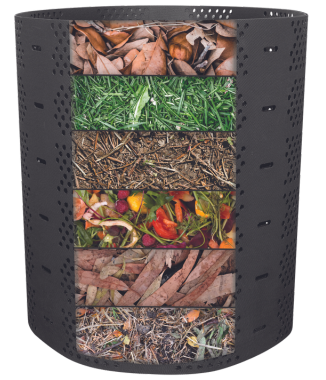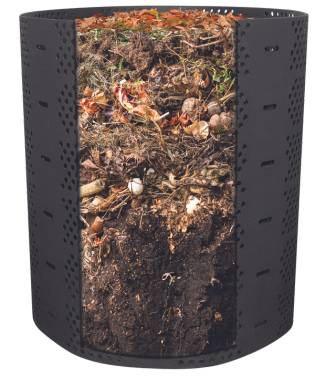May 29 is Learn About Composting Day: Discover Tips & Benefits of Composting With the GEOBIN® Composter
Posted May 16, 2023May 29 is Learn About Composting Day—an annual holiday established to raise awareness about the importance of composting and its positive impact on the environment. As a result of such efforts, many individuals and communities now actively participate in composting initiatives, whether through backyard composting or community composting programs.
Composting is the process of breaking down organic waste into a nutrient-rich soil amendment used to improve crop yields. Composting not only reduces overall waste, but also helps mitigate the effects of climate change by reducing greenhouse gas emissions. Composting has been practiced for centuries, dating back to ancient civilizations and was primarily used to dispose of waste and provide fertilizer for crops. However, with the growing emphasis on environmental sustainability, composting has gained significant traction as an effective means to minimize waste sent to landfills, lower methane emissions, and foster healthier soil ecosystems for sustainable agricultural practices.
If you are new to composting, getting started can seem daunting, but with the right tools and information, composting can be an easy and rewarding activity. To start composting, all you need is a compost bin and organic waste. The GEOBIN® Composter, a popular option for beginners and experts alike since 2012, is an easy-to-use and affordable option for backyard composting. Its lightweight design, adjustable size, and efficient airflow promote proper decomposition, making it an ideal choice for those venturing into the world of composting.
Here are some tips for getting started with the GEOBIN Composter:

Choose a desirable location: Choose a location in your yard that is well-drained and receives partial sun. If possible, avoid placing the composter in an area with too much sun or shade.
Add organic waste: Begin by adding organic waste such as fruit and vegetable scraps, dry leaves, cardboard, coffee grounds, and grass clippings to the composter. It’s best to layer carbon-rich “brown” material and nitrogen-rich “green material.” Avoid adding meat, dairy, and oily foods, as they can attract pests and slow down the composting process.
For the GEOBIN Composter, we recommend a 3:1 ratio of browns to greens. Sources of carbon include dried leaves, twigs, cardboard, and sawdust, while nitrogen-rich materials include food scraps, grass clippings, and coffee grounds.
Turn the compost: To speed up the composting process, turn the compost every few weeks. This helps to aerate the compost and distribute moisture and heat evenly. There are a few different ways to turn your compost in the GEOBIN Composter.
Tips for turning compost
- Unlock the Closure Keys and open the GEOBIN Composter to empty its contents. After reassembling it, you can add the new material to the bottom of the GEOBIN Composter and use the finished compost from the bottom of the bin in your garden.
- To incorporate all the organic material and maintain airflow in your compost bin, you can use a pitchfork to turn the contents. By mixing everything up, you ensure that the materials break down evenly, and air can circulate throughout the pile. This will help speed up the composting process, producing nutrient-rich soil that can be used for gardening.
- A great way to maximize your composting efforts is to use a multi-bin system. With this method, you can transfer new organic material from one GEOBIN Composter to a second compost bin, allowing you to access the finished compost at the bottom of the first bin while continuing to compost new material in the second bin. If you want to take things even further, you can add a third GEOBIN to the mix, creating a continuous composting cycle. With a multi-bin system, you can make the most of your composting efforts and enjoy a steady supply of nutrient-rich soil for your garden or landscaping needs.

Monitor moisture: Compost needs to stay moist to break down properly. However, excess moisture can reduce the amount of oxygen in the compost, which will slow down—or even halt—the breakdown of organic material by microorganisms. This can lead to a pile that is slow to decompose and produces an unpleasant odor. Check the compost regularly to ensure it is moist, like a wrung-out sponge, but not waterlogged.
Use the compost: Once the compost has broken down into a dark, crumbly material, it is ready to use in your garden. Use it to amend soil, fertilize plants, or as a mulch.
Composting is an easy and rewarding way to reduce waste and improve soil health. By using the GEOBIN Composter and following these tips, you can start composting today and make a positive impact on the environment while providing nutrient-rich compost to your fruits and vegetables.

